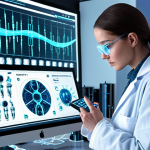Imagine having a personal roadmap to your health, uniquely tailored just for you. That’s the mind-blowing potential of gene analysis software, rapidly evolving beyond just tracing ancestry.
Frankly, the advancements I’ve witnessed in personalized medicine and preventative healthcare, driven by AI and machine learning interpreting our unique genetic blueprints, are truly incredible – it’s a paradigm shift, not just hype.
From predicting disease risks to optimizing drug efficacy, this technology is redefining how we approach wellness, even as we navigate emerging ethical debates and data privacy concerns.
Let’s dive deeper into this below.
Decoding Your Personal Blueprint: Beyond Just Lineage

It’s genuinely mind-boggling when you stop to think about it – our very essence, our health predispositions, even our responses to medications, all encoded within that double helix of DNA.
For years, gene analysis software was primarily marketed as a fun way to trace your family tree, to see if you had a surprising Viking ancestor or distant relatives across the globe.
And honestly, for a long time, that’s where my own understanding was stuck. I remember vividly the excitement of getting my first ancestry report back, piecing together the geographical tapestry of my heritage.
It was fascinating, a genuine peek into the past. But what I’ve seen unfold in the last few years, particularly as these technologies mature, is a profound shift.
We’re moving light-years beyond genealogy, delving deep into the operational manual of our own bodies. This isn’t just about knowing where your great-great-grandparents came from anymore; it’s about understanding how your specific genetic makeup influences your present health and what your future might hold.
The sheer amount of data, when interpreted by sophisticated algorithms, offers insights that simply weren’t possible a decade ago. It feels like stepping into a science fiction novel, only it’s our real, tangible reality.
1. The Evolution of Genetic Insight: From Fun to Functional
Remember those early days when consumer DNA kits first hit the market? It was all about novelty, the excitement of discovery, and perhaps a few laughs about how much Neanderthal DNA you carried.
I certainly bought into the hype, seeing it as a cool party trick. But the analytical power behind these services has quietly, yet rapidly, advanced. What was once a broad strokes analysis of population groups has become a nuanced examination of specific genetic markers linked to various traits, conditions, and even responses to environmental factors.
It’s like upgrading from a blurry, black-and-white photo of your family to a high-definition, full-color documentary about every member. This leap is powered by incredible advancements in bioinformatics, the field that combines biology with computer science, allowing these software platforms to process and interpret immense datasets with a precision that human analysis simply couldn’t achieve at scale.
I genuinely feel like we’re on the cusp of something revolutionary, where personalized data isn’t just a luxury, but a cornerstone of proactive health management.
2. Beyond Just Traits: Unpacking Predispositions and Responses
While it’s still fun to learn if you’re predisposed to liking cilantro or being an early riser, the real meat of modern gene analysis software lies in its ability to highlight genetic predispositions to certain health conditions or unique responses to specific nutrients or medications.
I was initially skeptical, thinking it sounded too much like fortune-telling. But after seeing friends optimize their supplement intake based on their genetic reports, or discover specific diet recommendations that genuinely made them feel better, my perspective completely shifted.
For instance, some people metabolize caffeine incredibly slowly, leading to jitters and sleeplessness even hours after a morning coffee, simply due to a specific gene variant.
Others might have a predisposition to lower levels of certain vitamins. This isn’t about diagnosis; it’s about information that empowers you to make smarter lifestyle choices.
It’s about taking the guesswork out of personal wellness and equipping yourself with data-driven insights that feel incredibly personal and actionable.
Tailoring Wellness: Your DNA as a Personal Health Guide
Forget one-size-fits-all diet plans or generic workout routines – those approaches, while well-intentioned, often fall flat because they don’t account for the incredible biochemical individuality of each human being.
My own experience with fad diets in the past was a frustrating cycle of hope and disappointment, never quite understanding why what worked for others didn’t work for me.
It was only when I started to truly appreciate the implications of personalized genomics that a lightbulb went off. Gene analysis software offers a powerful lens into this individuality, providing insights that can genuinely revolutionize how you approach everything from your breakfast choices to your evening run.
Imagine knowing, with a high degree of probability, that your body processes carbohydrates less efficiently than fats, or that you have a higher genetic potential for endurance over power.
These aren’t just academic curiosities; they are actionable insights that can fundamentally reshape your path to optimal health and fitness, making your efforts far more effective and sustainable.
1. Optimizing Nutrition for Your Unique Metabolic Profile
One of the most immediate and impactful applications of gene analysis for me has been in the realm of nutrition. I used to blindly follow generic “healthy eating” advice, which often left me feeling sluggish or bloated.
When I finally dove into my own genetic report, I discovered several fascinating insights related to my metabolism. For example, I learned I had a specific variant that suggested a reduced ability to process certain types of saturated fats effectively, making a plant-forward diet even more critical for me than for someone else.
Conversely, it highlighted that my body might benefit from a higher intake of certain omega-3 fatty acids. This wasn’t about restrictive dieting; it was about intelligent, personalized eating.
It’s about understanding your body’s unique operating system and fueling it with precisely what it needs to thrive, rather than guessing. This level of detail about individual nutrient absorption, detoxification pathways, and even predispositions to sensitivities like lactose or gluten, provides an unparalleled roadmap for dietary choices that truly resonate with your body.
2. Customizing Fitness Regimens for Peak Performance
Beyond diet, genetic insights can also be a game-changer for your fitness routine. Have you ever wondered why some people seem to naturally excel at sprinting, while others are born marathoners?
Part of that secret lies in our genes. My own report highlighted a genetic predisposition towards endurance-based activities, which honestly, felt like a validation of my lifelong love for long-distance running.
It also offered clues about my muscle fiber composition and recovery rates, allowing me to fine-tune my training schedule to maximize gains and minimize injury risk.
This isn’t to say your genes are your destiny – far from it! Environmental factors, training, and effort are paramount. But understanding your genetic blueprint allows you to work *with* your body, not against it.
It helps you prioritize exercises that you’re genetically predisposed to excel at, and structure your recovery to match your body’s natural healing rhythms.
This leads to more efficient workouts, fewer plateaus, and a greater enjoyment of your physical activity because you’re playing to your strengths.
Proactive Health Management: Anticipating and Mitigating Risks
Let’s be frank: none of us want to be surprised by serious health issues. While a gene analysis report is absolutely not a diagnostic tool – and it’s critical to understand that distinction – it can provide incredibly valuable information about your genetic predispositions to certain conditions.
For me, this was the most impactful, and frankly, emotionally resonant, part of the entire experience. It’s a powerful feeling to move from a place of blissful ignorance or vague anxiety to one of informed proactive management.
My family has a history of certain cardiovascular issues, and seeing genetic markers associated with that predisposition in my report was a wake-up call.
It wasn’t about fear; it was about empowerment. It prompted me to have a much more detailed conversation with my doctor, to schedule screenings earlier, and to double down on lifestyle changes that I knew could mitigate those risks.
This kind of information, when handled responsibly and in consultation with medical professionals, shifts the paradigm from reactive illness treatment to proactive wellness safeguarding.
1. Understanding Disease Predispositions, Not Diagnoses
It’s crucial to reiterate: genetic reports reveal predispositions, not diagnoses. Having a genetic marker for a certain condition simply means you *might* have an elevated risk compared to the general population.
It does not mean you *will* develop the condition. This nuanced understanding is paramount. I remember feeling a slight jolt of anxiety when I first saw a highlighted risk for a particular condition.
But that feeling quickly gave way to a sense of agency. The report, alongside genetic counseling, helped me grasp the difference between absolute risk and relative risk.
It led me to research specific preventative measures – changes in diet, increased exercise, targeted supplements – that have been shown to reduce the risk associated with those markers.
It was less about a crystal ball showing my future, and more about a sophisticated early warning system, prompting me to build healthier habits and stay vigilant about my routine check-ups.
2. Tailoring Screenings and Lifestyle Interventions
With insights into potential predispositions, you can work with your healthcare provider to develop a highly personalized preventative health plan. This might involve earlier or more frequent screenings for certain conditions, or a greater emphasis on specific lifestyle interventions known to counteract those genetic tendencies.
For instance, if your genes suggest a higher risk for type 2 diabetes, your doctor might recommend more frequent blood sugar checks, a very specific dietary plan, and a structured exercise regimen, even if you’re currently healthy.
This collaborative approach, where your genetic data informs your healthcare strategy, is where the real magic happens. It’s not just about treating illness; it’s about investing in wellness and building a robust defense against potential future health challenges.
It’s an incredibly empowering feeling to know you’re actively participating in shaping your health trajectory.
The Pharmacogenomics Revolution: Drugs Tailored to Your Genes
Imagine taking a medication, and it just… works. No trial and error, no debilitating side effects, just the right dose for your unique biology. For too long, medicine has operated on a somewhat generalized model, assuming a drug will affect most people in roughly the same way.
But anyone who’s ever been through the frustrating process of finding the right antidepressant, the optimal blood pressure medication, or even just the correct dosage of pain relievers knows that this isn’t always the case.
Our bodies metabolize drugs differently, absorb them at varying rates, and respond to them in ways that are deeply influenced by our genetic makeup. This is where pharmacogenomics, the study of how genes affect a person’s response to drugs, steps in, and frankly, it’s one of the most exciting frontiers in personalized medicine that gene analysis software is making accessible.
It has the potential to transform drug prescription from a guessing game into a highly precise science.
1. Predicting Drug Efficacy and Side Effects
One of the most incredible capabilities of advanced gene analysis software is its ability to predict how you might respond to certain medications. I vividly recall a friend struggling for months to find an antidepressant that didn’t cause severe side effects.
Her doctor eventually ordered a pharmacogenomic test, and the results were eye-opening. The test revealed specific gene variants that indicated she was a “poor metabolizer” of several commonly prescribed antidepressants, meaning the drugs would build up to toxic levels in her system.
Conversely, it identified another class of antidepressants that she would likely metabolize normally, leading to proper therapeutic effects with fewer side effects.
This knowledge instantly guided her doctor to the right prescription, saving her months of suffering and trial-and-error. This ability to foresee potential efficacy or adverse reactions before a patient even takes the first dose is a monumental leap forward in patient safety and treatment effectiveness.
It moves us away from a reactive “let’s see what happens” approach to a proactive, informed decision-making process, making the patient journey far more efficient and comfortable.
2. Optimizing Dosage and Treatment Protocols
Beyond just predicting which drugs will work, pharmacogenomics can also help determine the optimal dosage. Think about it: if two people take the same dose of a drug, but one metabolizes it very quickly while the other metabolizes it very slowly, their bodies will experience vastly different concentrations of that drug.
This can lead to either a lack of therapeutic effect (if metabolized too quickly) or toxicity (if metabolized too slowly). Gene analysis can provide insights into these metabolic pathways, allowing doctors to fine-tune dosages from the outset.
This isn’t just about common medications; it’s also incredibly relevant for more complex drug regimens, like chemotherapy or certain autoimmune treatments, where precision dosing can make a life-or-death difference.
The potential to personalize treatment protocols, minimizing adverse drug reactions and maximizing therapeutic benefit based on an individual’s unique genetic blueprint, is truly revolutionary.
It transforms the patient into a unique individual with their own specific needs, rather than just another statistic.
Navigating the Ethical Labyrinths and Privacy Concerns
As groundbreaking as gene analysis software is, it’s not without its complexities and controversies. When we talk about unlocking our deepest biological secrets, ethical questions naturally arise.
Data privacy, potential for discrimination, and the very concept of “knowing too much” about our future health are conversations we absolutely must have as this technology becomes more mainstream.
I remember feeling a moment of hesitation before sending off my sample, wondering exactly who would have access to this incredibly intimate data and how it might be used in the future.
It’s a legitimate concern, and it’s one that the industry, regulators, and consumers alike need to approach with the utmost seriousness. The potential benefits are immense, but they must be balanced with robust safeguards and transparent practices to ensure that this powerful technology serves humanity responsibly.
1. Data Security and the Future of Genetic Privacy
The moment you send your DNA sample to a lab, you’re entrusting them with arguably the most personal data imaginable. Your genetic code is unique to you; it cannot be changed, and it contains information not just about your health but potentially about your family members too.
This raises critical questions about data security: How is your raw genetic data stored? Who has access to it? Can it be anonymized effectively?
And perhaps most importantly, how secure are these databases from breaches? While most reputable companies employ robust encryption and security protocols, the long-term implications are still evolving.
We’ve seen how other forms of personal data can be misused, and the stakes are even higher with genetic information. As consumers, we need to be incredibly diligent about understanding the privacy policies of any service we use, demanding transparency, and advocating for stronger regulations to protect our genetic blueprints.
2. The Evolving Landscape of Consent and Discrimination
Another significant ethical consideration revolves around informed consent and the potential for genetic discrimination. When you consent to a genetic test, are you fully aware of all the ways your data might be used, now and in the future?
What if insurance companies or employers gain access to this information? Could it lead to higher premiums or even job discrimination based on genetic predispositions?
While laws like the Genetic Information Nondiscrimination Act (GINA) exist in some regions (like the US), they often have limitations and don’t cover all scenarios, such as long-term care or life insurance.
This is a complex area where legal frameworks are struggling to keep pace with rapid technological advancements. It’s a reminder that while the science is moving at warp speed, our societal and regulatory discussions must also evolve to ensure that the incredible power of genetic insight is used equitably and ethically for everyone’s benefit.
Choosing Your DNA Journey: What to Look for in a Service
With so many gene analysis software and testing services popping up, choosing the right one can feel overwhelming. It’s not just about picking the cheapest option or the one with the most flashy marketing.
This is about your deeply personal health information, so due diligence is paramount. I spent a considerable amount of time researching different providers before making my choice, wading through countless reviews and privacy policies.
It’s a journey, not just a purchase, and you want to ensure your journey is with a reputable guide.
| Feature | Why It Matters |
|---|---|
| Scientific Validation | Are the insights based on robust, peer-reviewed scientific studies? Look for clear references and methodologies. Avoid services making unsubstantiated claims. |
| Privacy Policy | Read it carefully! Understand how your data is stored, shared, and anonymized. Can you request deletion of your raw data? |
| Report Clarity & Actionability | Is the report easy to understand? Does it provide actionable recommendations or just raw data? Look for clear explanations and practical advice. |
| Customer Support & Resources | Do they offer genetic counseling or support from qualified professionals? Are there educational resources to help interpret results? |
| Data Ownership & Portability | Can you download your raw genetic data? This allows you to explore third-party analysis tools if you wish, giving you more control. |
1. The Cruciality of Scientific Rigor and Transparency
Any reputable gene analysis service should base its findings on strong scientific evidence. This means looking for companies that reference peer-reviewed studies, collaborate with academic institutions, and are transparent about their methodology.
Avoid services that make sweeping, unsubstantiated claims or promise miracle cures. My personal rule of thumb: if it sounds too good to be true, it probably is.
I prioritize companies that clearly explain *how* they derive their insights from your DNA, rather than just presenting a list of “risks” or “traits.” This commitment to scientific integrity ensures that the information you receive is reliable and actionable, building trust in what can otherwise feel like a black box of complex biological data.
2. Understanding Privacy Policies and Data Handling
This is, without a doubt, the most important aspect to scrutinize. Before you even consider spitting into a tube, dive deep into the company’s privacy policy.
Who owns your data once you submit it? Can they share it with third parties, and under what circumstances? Can you request your raw data to be permanently deleted from their servers?
These are not trivial questions. I’ve seen some policies that are incredibly vague, which immediately raises red flags. Look for clear, concise language that outlines their commitment to protecting your information and gives you control over your own data.
Remember, your genetic blueprint is incredibly personal, and you have every right to understand exactly how it will be handled. Your peace of mind, in this instance, is priceless.
My Personal Deep Dive: What I Learned From My Own Genetic Blueprint
When I finally received my comprehensive genetic report, after months of anticipation and admittedly, a fair bit of skepticism, I approached it with a mix of excitement and trepidation.
I was eager to see what new insights it might reveal, but also a little nervous about uncovering potential predispositions. What I found was genuinely transformative.
It wasn’t about being told I had a specific disease, but rather about gaining an incredible level of clarity on my body’s unique operating system. It was like finally getting the user manual for myself, after years of trial and error.
The experience was far more profound than just a list of facts; it was a deeper connection to my own biology and a newfound sense of empowerment over my health journey.
1. Unexpected Insights and Confirmations
Some of the results were simply fascinating confirmations of things I’d vaguely intuited. For example, the report highlighted a genetic variant associated with a higher need for specific B vitamins, which explained why I always felt better when I consistently supplemented them, even though I hadn’t known the precise reason.
But then there were the truly unexpected insights. I discovered a genetic predisposition to a slower metabolism of caffeine, which immediately explained why I felt so wired and anxious even after a single morning coffee, something I’d always just dismissed as “being sensitive.” Armed with this knowledge, I scaled back my caffeine intake dramatically, and the difference in my anxiety levels and sleep quality was almost immediate and profound.
These aren’t minor tweaks; they’re fundamental shifts based on deeply personal data, leading to a much better quality of life. It’s those “aha!” moments that truly solidify the value of this technology.
2. Empowering Proactive Lifestyle Adjustments
The most significant impact for me was the shift from a reactive to a proactive mindset. Knowing about a slightly elevated genetic predisposition to a particular metabolic condition, for instance, didn’t make me anxious.
Instead, it fueled my motivation to double down on specific lifestyle habits that research suggests can mitigate that risk. This included tweaking my diet to focus even more on anti-inflammatory foods and ensuring I maintained a consistent exercise routine.
It also prompted me to have a more in-depth conversation with my primary care physician, sharing my genetic insights and discussing a personalized screening schedule.
This collaborative approach with my doctor, informed by my unique genetic blueprint, has given me an incredible sense of control and confidence in managing my long-term health.
It’s not about fearing the future; it’s about actively shaping it, one informed decision at a time.
Closing Thoughts
Stepping into the world of gene analysis software has been nothing short of a revelation for me. It’s transformed my understanding of wellness from a generic pursuit into a deeply personal, data-driven journey.
This isn’t about chasing fleeting health fads or blindly following generic advice anymore; it’s about harnessing the incredible power of your own unique genetic blueprint to make informed decisions that genuinely resonate with your body.
It’s about moving beyond mere lineage and truly decoding your personal operating manual, paving the way for a healthier, more proactive, and profoundly personalized future.
Useful Information to Keep in Mind
1. Always consult with a qualified healthcare professional or a genetic counselor to interpret your results and make informed health decisions. Genetic insights are powerful but should always be part of a broader health strategy.
2. Remember that genetic analysis reports provide predispositions and tendencies, not definitive diagnoses. Having a genetic marker for a condition doesn’t mean you will develop it, but rather indicates a potential increased risk.
3. Prioritize your data privacy and security. Thoroughly read the privacy policies of any genetic testing service you consider using. Your genetic information is incredibly personal and should be protected with the utmost care.
4. Lifestyle and environmental factors play a massive role in your health outcomes. Your genes load the gun, but your lifestyle pulls the trigger. Genetic insights are a guide, not a destiny, encouraging proactive health habits.
5. The field of genomics is rapidly evolving. What we understand today will be expanded upon tomorrow. Stay curious, stay informed, and engage with reputable sources for ongoing learning.
Key Takeaways
Gene analysis software offers a powerful lens into your unique biological makeup, moving far beyond ancestry to provide actionable insights for personalized nutrition, fitness, and proactive health management.
It also signals a revolution in pharmacogenomics, allowing for more precise medication choices. While incredibly beneficial, navigating this journey responsibly requires careful consideration of data privacy and ethical implications, ensuring informed consent and consultation with healthcare professionals.
Ultimately, it’s about empowering you with your own biological blueprint to make smarter, more tailored health decisions.
Frequently Asked Questions (FAQ) 📖
Q: So, beyond just finding out if I have Viking ancestors, how does this gene analysis software actually help me with my health right now?
A: That’s the million-dollar question, isn’t it? And frankly, it’s where the real magic happens. What I’ve personally seen, and what genuinely excites me, is how it shifts from generic health advice to something truly bespoke.
Imagine going to your doctor and instead of a ‘one-size-fits-all’ dietary recommendation, they’re saying, “Based on your unique genetic markers, your body processes fats in this specific way, so this diet might be incredibly effective for you, or this type of exercise will yield better results.” It’s not just about predicting a disease risk, though that’s huge.
It’s also about optimizing daily wellness – understanding your individual metabolism, potential drug interactions even before you take a new prescription, or pinpointing why certain supplements might work wonders for you but do absolutely nothing for your neighbor.
It’s like getting a personal instruction manual for your own body, and let me tell you, having that kind of tailored insight? It feels like a real superpower for proactive health management.
Q: This sounds incredible, but the intro mentioned “ethical debates and data privacy concerns.” How serious are those, really, and what should I be aware of if I consider using this technology?
A: Oh, they are absolutely serious, and it’s a conversation we need to be having constantly. Look, as mind-blowing as the health benefits are, the ethical landscape is a bit of a sticky wicket, to be honest.
My biggest concern, and one I often hear from others, revolves around who owns your genetic data once it’s in the cloud. We’re talking about the most intimate blueprint of who you are!
What if that data gets hacked? What if an insurance company somehow gets hold of it and uses it to deny coverage, or an employer uses it for hiring decisions?
There are regulations trying to keep pace, but the technology moves so fast. You really have to read the fine print with these services, understand their data retention policies, and ask tough questions about anonymization and third-party sharing.
It’s a fundamental tension between unlocking incredible health insights and safeguarding your most personal information. It’s not just a hypothetical; it’s a very real challenge we’re all navigating as this field expands.
Q: Is this personalized gene analysis just for the super-wealthy, or is it becoming something everyday people can access and use in their regular healthcare?
A: That’s a fantastic point, and honestly, it’s a journey we’re very much in the middle of. Initially, yes, it felt like something out of a sci-fi movie or reserved for those with deep pockets.
But what I’ve seen over the last few years is a clear trajectory towards much greater accessibility. Think about how much cell phones cost when they first came out versus now; it’s a similar pattern.
Direct-to-consumer kits have driven down the cost of basic analysis significantly, making it more within reach for many households. The real frontier now is integrating this information seamlessly into standard healthcare practices.
We’re not quite there yet where every doctor’s visit starts with a genetic profile review, but the conversations are happening, the research is pushing forward, and insurance companies are starting to cautiously explore coverage for certain targeted genetic tests, especially for specific conditions or drug sensitivities.
It’s a gradual but definite shift from niche, specialized service to something that will, I genuinely believe, become a routine part of preventative and personalized care for a much broader segment of the population in the not-too-distant future.
It’s an exciting time to be alive, seeing this unfold.
📚 References
Wikipedia Encyclopedia
구글 검색 결과
구글 검색 결과
구글 검색 결과
구글 검색 결과
구글 검색 결과






